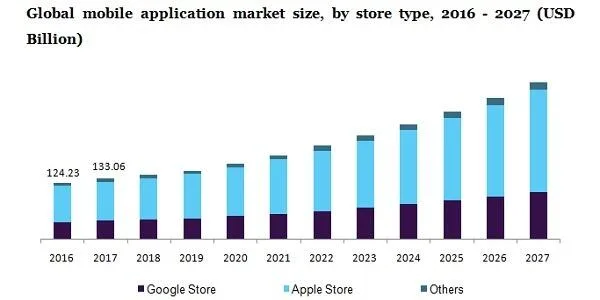Today, mobile apps are expected to generate over $935 billion in revenue in 2023 and have a considerable influence on small-scale business
However, this score was multiplied over the month it was seen that half of the time they were on the phones especially if they are employees.
The sudden drastic change in mobile app development also enhanced the business tactics, which are now completely associated with smartphones.
Companies that have been renowned as mobile app development companies are shifting towards mobile phones since the hype of smartphones is raising significantly.
The global mobile app industry market size was estimated at USD 187.58 billion in 2021 and was expected to reach USD 206.73 billion in 2022.
Apple App Store – 1.96 million apps available for download.
Google Play Store – 2.87 million apps available for download on the Google Play Store.
Top Factors For Application Development
- Any app-developing agencies must be reasonable for all the clients, and the outcome must be impressive in sense of quick turnover which can stand out amongst the entire marketplace.
- The backend team must apply to present all-rounder solutions, to avoid hassle and present improvement plans.
- Ensure that the application runs appropriately using multiple operators across the global network.
- If ample users are accessible then developers must be certain about privacy concerns, and high authentication must be present.
- Users mostly prefer excellent battery health; the uncertainty of the applications appears here.
- In ample applications, the attractive UI/UX lacks, which gets problematic while using the application.
- Synchronization is applicable in all applications since the regular data must be stored for a better experience.
- An effective communication channel is essential to promote different promotional content, offers, and new updates or if there are any issues then it’s easier to get associated with Customer Service.
Influence Of Mobile Devices On The Business
Mobile devices are providing businesses with greater flexibility, enhance workflows, improve communications, and help to make users more efficient and productive. They also provide organisations with a competitive edge, as faster and more collaborative communications enable companies to make faster decisions
Why Mobile App Development Is Beneficial for Business?
- Rapid Engagement:
It’s a direct channel to the marketing of business and the relative launch, a direct communication form. In mobile applications, there’s this quick access to in-app notifications which is easy for the users. Loyalty is enhanced between the customer and easier to convert potential customers to permanent customers.
2. Better Retail Exposure:
Meeting the expectation of customers through analysing the customer’s experience by providing different approaches and unique offers. Mobile application purchasing is comparatively cheaper and more convenient for people who have a busy schedule and an increase in profit ratio. Many businesses are relying on mobile applications.
These apps have revolutionised the way small businesses operate and communicate with their customers, leading to increased profits and customer satisfaction.
The impact of mobile apps on small-scale businesses cannot be ignored, and this article will delve into the dramatic ways in which they influence these businesses.
One of the most significant benefits of mobile apps for small-scale businesses is their ability to increase customer engagement. With the ability to access a company’s products and services on-the-go, customers are more likely to interact with a small business via a mobile app than through traditional methods.
This increased engagement leads to more loyal customers who are more likely to return to the business time and again. In addition, mobile apps provide small businesses with valuable customer feedback, allowing them to improve their products and services to meet customer needs.
Challenges For Small-Scale Businesses
Mobile apps are not without their challenges for small-scale businesses. Developing a mobile app can be expensive, and small businesses may not have the resources to create a high-quality app that meets customer needs.
Additionally, maintaining and updating a mobile app can be time-consuming and requires technical expertise that small businesses may not have.
Despite these challenges, the benefits of mobile apps for small-scale businesses are clear. From increased customer engagement to improved efficiency and marketing capabilities, mobile apps are transforming the way small businesses operate.
As the digital landscape continues to evolve, mobile apps will become even more important for small businesses looking to stay competitive in an increasingly crowded marketplace.
Mobile Application Market Share Insights
Apple Inc., Microsoft Corporation, Google LLC, Practo, Netflix Inc., Gameloft SE, and Amazon Inc. are among the major market players investing heavily in research and development to create more user-friendly interfaces.
They are also expanding their product portfolios and geographic reach through strategies such as partnerships and acquisitions. One example is GOQii, which in 2018 raised funding from Mitsui & Co., Ltd., a Japanese healthcare investor, to support its growth.
Industry Insights
Mobile applications that offer a range of services, including gaming, music and entertainment, health and fitness, retail and e-commerce, and social networking, are becoming increasingly popular worldwide.
As a result, many mobile app developers are now using advanced technologies such as big data, artificial intelligence (AI), and machine learning (ML) to expand their product offerings and reach a larger audience.

Extended Summary
Mobile devices and access to the application on smartphone devices are essential for all businesses whether small-scale or established enterprises.
A business owner can’t comprise when it comes to the strategies regarding implementing mobile application.







